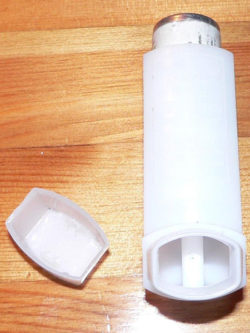Medical devices
The World Health Organization and European Union definitions of medical devices can be condensed to: An article, instrument, apparatus or machine that is used in the prevention,diagnosis or treatment of illness or disease, or for detecting, measuring-, restoring,correcting or modifying the structure or function of the body for some health purpose. The spectrum of medical devices ranges from a simple pair of spectacles to improve eyesight, to the technologically complex magnetic resonance imaging (MRI) machine used to examine organs inside the body.
- A metred-dose inhaler.
Typically, medical devices are used when medicines alone cannot achieve the desired effect, such as a pacemaker. However, medicine/medical-device combinations exist (often referred to as medicine–device), such as the inhalers used by patients with asthma, and adrenaline–injector combination for the treatment of anaphylaxis (a severe allergic reaction).
Medical devices are the most widely used medical products. More than 10,000 categories of devices exist in the world and so have a diverse range of features. Medical devices can be classified according to their uses into the following:
- diagnosis, prevention, monitoring, treatment, or alleviation of disease
- diagnosis, monitoring, treatment, alleviation of or compensation for an injury
- investigation, replacement, modification, or support of the body or of a physiological process
- supporting or sustaining life
- control of conception
- disinfection of medical devices
- providing information by means of examining samples taken from patients (for example, blood tests or biopsies)
In the EU, the safety, performance and quality of medical devices is regulated by the Medical Devices Directives, with specific rules applied to the different classes of device. Where a medical device contains a medicine (defined as an accessory), a marketing authorisation is required. The medical device regulatory framework is enforced by the individual country regulatory authorities.
Further Resources
- World Health Organisation (2015). Medical devices: Definitions. Retrieved June 22, 2015, from http://www.who.int/medical_devices/definitions/en/
- European Commission (2015, June 15). Medical devices. Retrieved June 22, 2015, from http://ec.europa.eu/growth/sectors/medical-devices/index_en.htm
A2-1.06.9-V1.2
